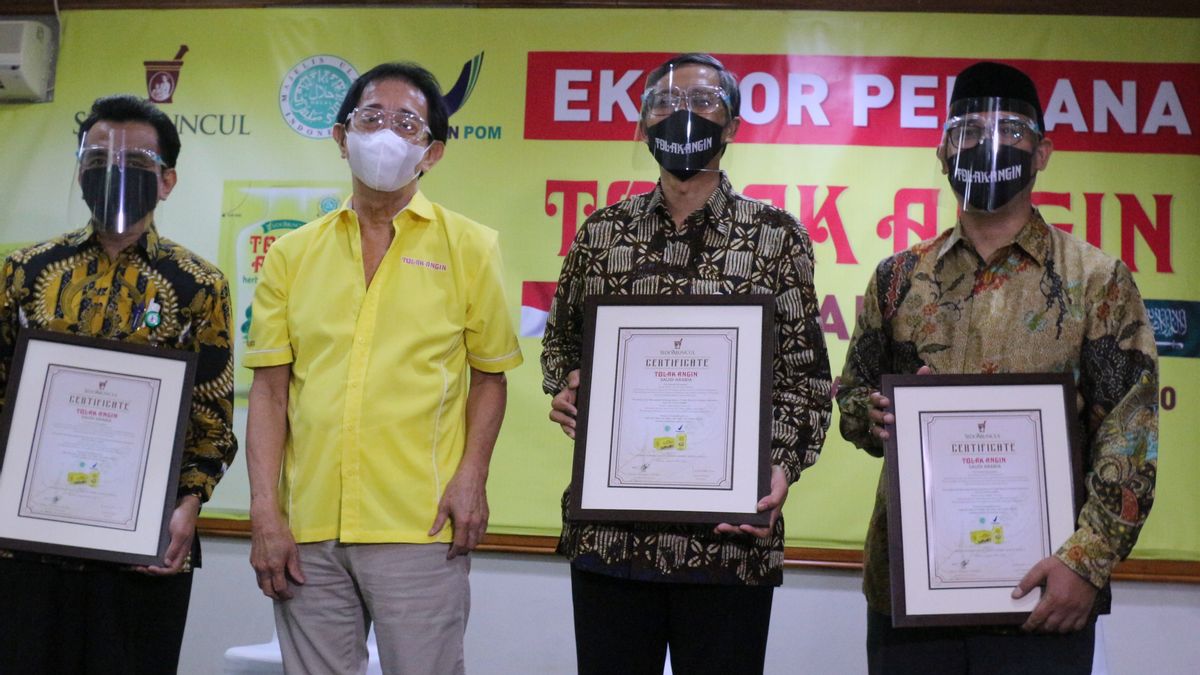JAKARTA - The country's herbal medicine industry has begun to enter the Middle East, one of which is Saudi Arabia. This was marked by the first export of PT Sido Muncul Herbal Medicine and Pharmacy Industry to the country.
Minister of Trade Agus Suparmanto also welcomed Sido Muncul's first export of spices to his delight. This success certainly raises optimism that food and beverage products (mamin), especially spices, can continue to drive national export performance.
"There are always opportunities in the midst of difficulties. One of them is the opportunity to export Indonesian spice products. This opportunity must continue to be exploited by business actors and this opportunity can also improve Indonesia's trade performance during the COVID-19 pandemic," the Trade Minister said in a statement. his statement quoted Tuesday, August 11.
The release of the first container, as well as the first export of PT Industri Jamu dan Farmasi Sido Muncul to Saudi Arabia, took place virtually yesterday, Monday, August 10. Meanwhile, the Director General of National Export Development of the Ministry of Trade, Kasan, said in his remarks that Indonesian herbal products continued to develop and were increasingly recognized internationally.
The Ministry of Trade is optimistic that this success will encourage the biopharmaceutical and food industry to continue to penetrate the global market amid the COVID-19 pandemic.
According to Kasan, this initial export was a follow-up to the signing of the cooperation between PT Industri Jamu and Sido Muncul Pharmacy and its partner, Mizanain from Saudi Arabia. The agreement was reached at the Trade Expo Indonesia (TEI) event in October 2019.
"We are proud of today's achievement. The Ministry of Trade also facilitates this export activity. Starting from the signing of the cooperation held at the 2019 Trade Expo Indonesia to the release of this first container," said Kasan.
Kasan also highly appreciates this export, considering that Saudi Arabia has implemented a policy of increasing import duty rates on 500 types of products to increase state revenue in response to the COVID-19 pandemic.
This policy is considered to have a direct or indirect impact on Indonesia's trade to Saudi Arabia. Among those not directly affected were the biopharmaceutical and food products sector.
According to Kasan, the COVID-19 pandemic has impacted all aspects of trade, both in terms of supply and demand. To that end, the Ministry of Trade is working with various parties, both at home and abroad to encourage export performance to continue to increase.
[/ read_more]
A number of steps have been taken by the Ministry of Trade, namely by simplifying / reducing restrictions and restrictions and accelerating the export process through the National Logistics Ecosystem and simplifying and accelerating the issuance of certificates of origin (SKA) for exported goods through the application of affixed signatures and stamps.
The Ministry of Trade also proposes that the Indonesian Export Financing Agency (LPEI) can provide a stimulus in the form of trade financing for exporters affected by COVID-19 and experiencing financial difficulties, as well as implementing work programs to encourage an increase in national non-oil and gas exports.
Also attending the launching of this first export were the Director of Traditional Medicine Supervision, the Food and Drug Supervisory Agency (BPOM) Martin Suhendri, the Indonesian Consul General in Jeddah Eko Hartono, Director of the Institute for the Study of Medicines and Cosmetics, the Indonesian Ulema Council, Lukmanul Hakim, Head Semarang Class 1 Agricultural Quarantine Center Parlin Robert Sitanggang, as well as Director of PT Herbal Medicine and Pharmacy Industry Sido Muncul Irwan Hidayat.
Based on BPS data processed by the Ministry of Trade, in the first semester of 2020, exports of Indonesian biopharmaceutical products reached US $ 4.2 million, an increase of 32.8 percent compared to the same period in 2019 which amounted to US $ 3.17 million. This significant growth is encouraging amidst the decline in the purchasing power of the world community.
Meanwhile, in January-June 2020 Indonesian exports reached 76.4 billion US dollars, while imports were recorded at 70.9 billion US dollars. In June 2020, Indonesia's non-oil and gas export performance began to move positively with an increase of 15.73 percent compared to the previous month.
On the other hand, imports of raw materials during that period also increased by 24.01 percent compared to the previous month. This shows that Indonesia's industrial activity is starting to stretch.
[/ read_more]
The English, Chinese, Japanese, Arabic, and French versions are automatically generated by the AI. So there may still be inaccuracies in translating, please always see Indonesian as our main language. (system supported by DigitalSiber.id)













